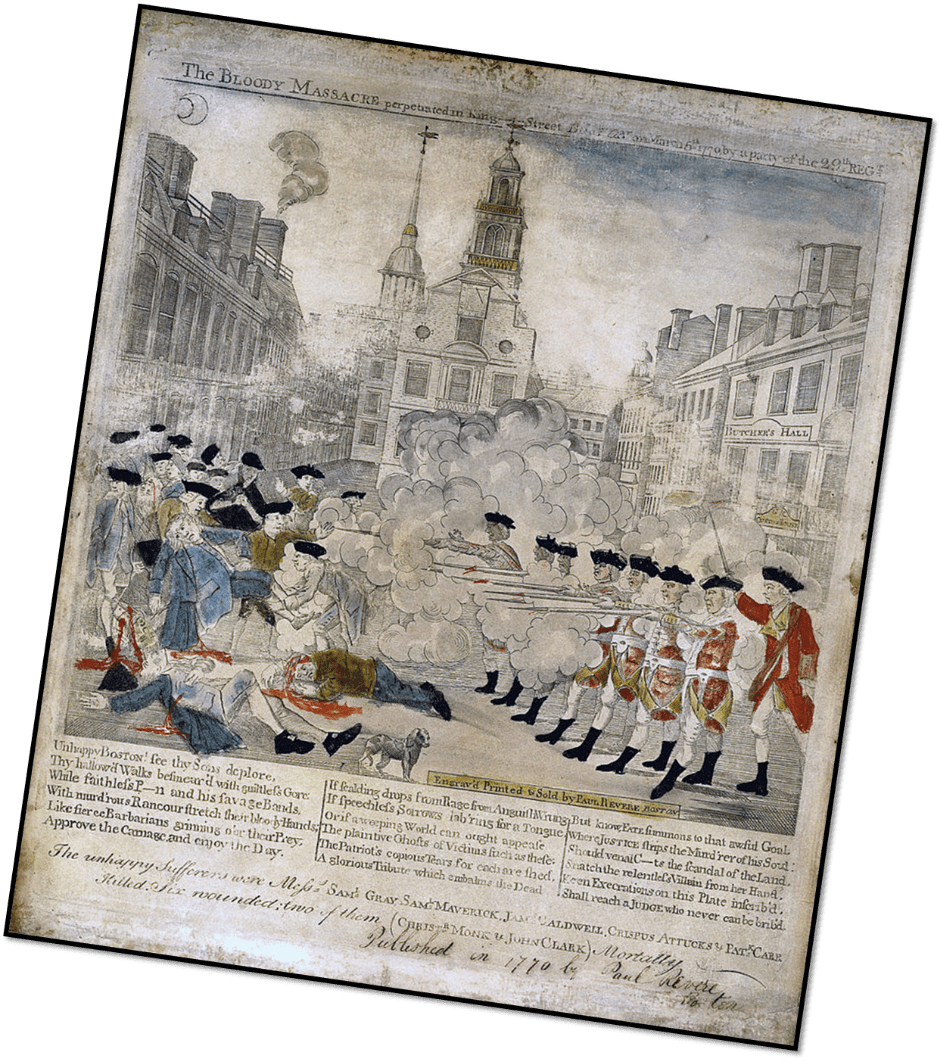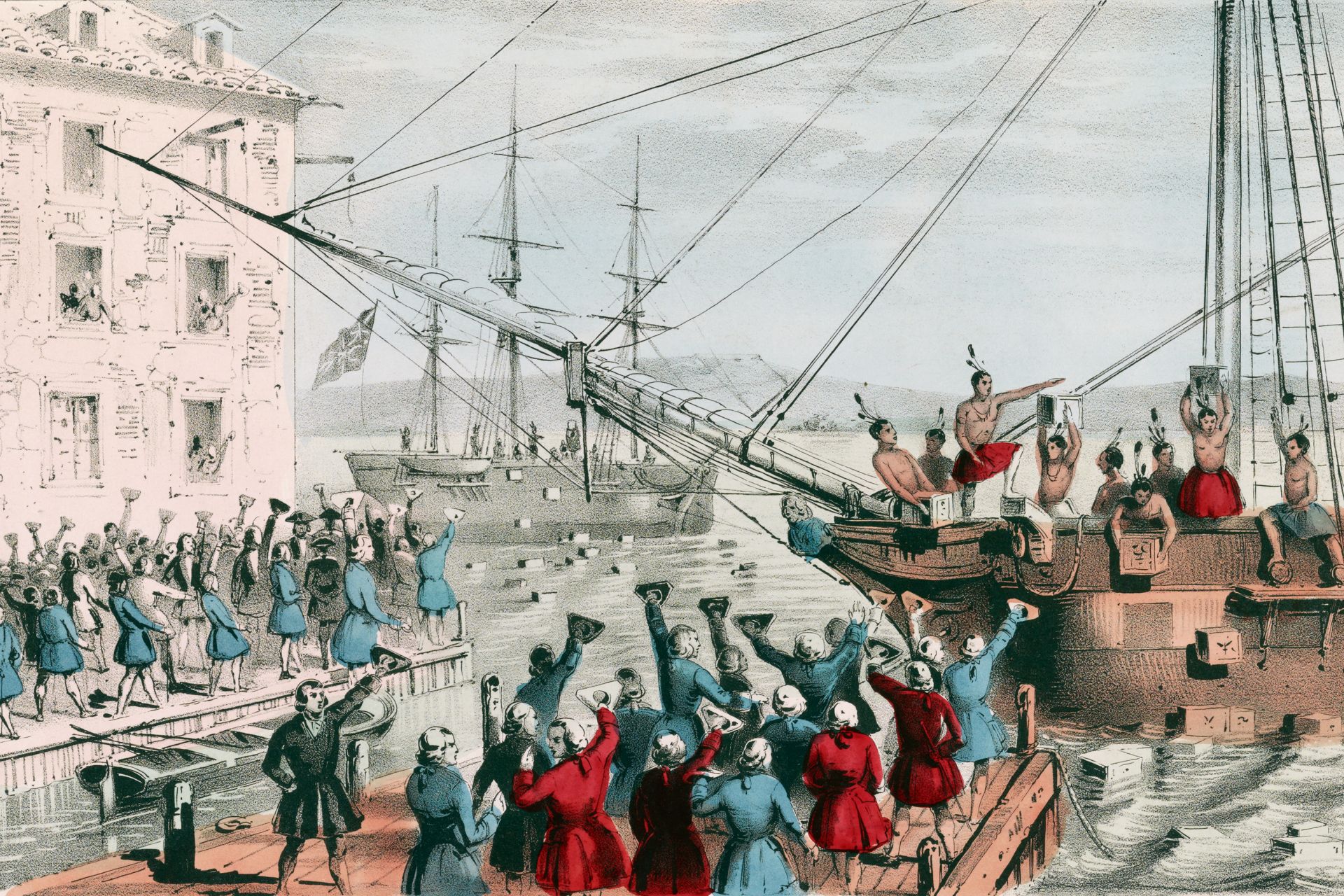This act put a tax on all printed material
Stamp Act
*Knock Knock, British troops show up at your door, and you have to let them in.
Quartering Act
This Chief led a rebellion against the British following the French and Indian War
Chief Pontiac
This was written to explain the reasons for the colonies to split from the British.
Common Sense
Patriots
This tax would be put on an item that would monopolize the market for the British East India Company and sweetening the deal
Sugar Act
Proclamation Act of 1763

This depicts a certain event.
Boston Massacre
A communication network to make sure all the colonies knew what was going.
Committee of Correspondence
He was selected to be the leader of the Continental Army.
George Washington
This act gave customs officials the writ of assistance to search for smuggled goods in private homes and businesses
Townshend Act
This act placed a tax on a popular drink in the colonies and it monopolized the trade for the British East India Company.
Tea Act
This put Great Britian in a large amount of debt.
The French and Indian War
This was written with 27 grievances against the British. The colonies must really not like the British
Declaration of Independence
These were people that were loyal to the crown.
Loyalist
Included in the Intolerable acts, it closed down this port.
Boston Port
To remove something or get rid of it.
Repeal
No one till this day knows who shot the first shot here.
Lexington and Concord
This colony was not present for the First Continental Congress.
Georgia.
He was the author of Common Sense
Thomas Paine
A phrase was said by the Son's of Liberty talking about how they had no say in Parliament.
"No Taxation without Representation"
To refuse to buy or not participate in.
Boycott

This image depicts a revolutionary event
The Boston Tea Party
This document was the last-ditch effort for the colonies to have piece with the King. Too bad he never read it, John Dickinson put a lot of work into that.
Olive Branch Petition
This rebellion group led different strikes, and protest against the British like the Boston Tea Party.
Son's of Liberty
This helped with the repealing of the Stamp where representatives met from the 9 colonies met in New York to discuss how the colonies need to approve taxation from the British.
Stamp Act Congress
An unjust use of government power
Tyranny
These were several meetings between delegates from all 13 colonies from 1775 to 1781 to discuss independence, raising an army, and potential peace.
2nd Continental Congress
Thomas Jefferson
He rode his horse around Massachusetts near Lexington and Concord to warn colonist that the British were coming.
Paul Revere
Going by the picture below, this would be the effect.

The Intolerable Acts
move goods illegally into or out of a country
The Massachusetts Militia faced off against the British and even though the British won, the colonist felt good about their odds.
Battle of Bunker Hill
A first attempt a uniting the colonies together but it would fail.
Albany Plan of Union
He inspired a lot of what was written in the Declaration of Independence.
John Locke
This group actually benefited from the Proclamation Act of 1763
Native Americans/Indigenous Groups
A small army made up of everday citizens trained to protect their town or colony in an emergency
Milita
This meeting's goal was to find a solution to the conflicts between Great Britain and the Colonies
This was sent to every colonial legislature to urge them to get the Townshend Acts repealed.
Circular Letter
This man was a leader in the Sons of Liberty, he led the 2nd Continental Congress, and left his mark with the Largest Signature on the Declaration of Independence
John Hancock
This act was part of the Intolerable Acts that stretched the border of a now Canadian Province into the Ohio River Valley, cutting off colonist even more in that area.
The Townshend act would later be repealed in 1770 except for this.
Tea
The British were sent to Concord to capture John Hancock and Samuel Adams but also this.
Destroy Weapons/Capture Munitions.
This would officially end the French and Indian War
Treaty of Paris in 1763
He actually defended the British soldiers in court after the Boston Massacre but would later switch sides to indpendence.
John Adams
This specific act that was part of the Intolerable Acts that had British officials tried for crimes to happen in England rather than in the Colonies.
Administration of Justice Act
"And be it further declared ..., That all resolutions, votes, orders, and proceedings, in any of the said colonies or plantations, whereby the power and authority of the parliament of Great Britain, to make laws and statutes as aforesaid, is denied, or drawn into question, are, and are hereby declared to be, utterly null and void to all intents and purposes whatsoever." Lot of bark but no actual bite
The Declaratory Acts
Gaspee
Author of the "Letter from of a Farmer in Pennsylvania"
John Dickinson
He was a pivotal leader in the Son's of Liberty and was related to the 2nd president of the United States.
Samuel Adams